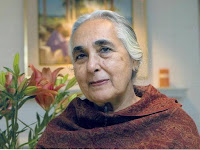Misplaced Contemporary Past:
 |
| Romila Thapar Pic Courtesy: The Hindu |
In the excerpt, she claims that educational
institutions are often used by administrators as stepping stones in order to
realise personal ambitions, which results in the credibility of an institution
taking a backseat. This is certainly true and one must appreciate her fine eye
for observing this. However, it must be mentioned that many of the appointments
for administrators are often political. For example, Rajan Welukar, completed
his five year term as the Vice-Chancellor of Mumbai University, despite a judicial case on his research credentials. Hence,
Ms. Thapar, I hope you will agree with me when I say that political
appointments lead to not just a credibility crisis but also a drastic shortfall
in research ideas. Small wonder, then, that Mumbai, despite being one of the
oldest Universities of the country, fails to appear even in the top 100
universities nationally.
In the book “Eminent Historians”, Arun Shourie effectively
brings out the modus operandi of how many Left-leaning historians use their
influence to seek an appointment in institutions. The capturing of premiere institutions
of the country has fairly been well-documented particularly since the rise of
social media. It is, therefore, indeed surprising that the political
appointments are not so much of a concern when research projects funded by the
Indian Council of Historical Research (ICHR) remain incomplete, despite
multiple extensions.
Further on, she says, proximity to a certain
ideology becomes the driving force of activity. Similar arguments are used to
trivialise or dismiss the research done by their right-wing counterparts. For
instance, our school textbooks and some of Ms. Thapar’s own books propagated
the alleged Aryan Invasion, despite scientific research debunking such claims.
Secondly, the ideological proximity is most visible when it comes to reading
school textbooks on post-independent India. Many of our textbooks expounded how
Jawaharlal Nehru, was not just India’s but South Asia’s tallest leader despite his
disastrous foreign policy initiatives such as the Non-Alignment, despite some glaring
strategic errors such as the UN resolution on Kashmir, misreading the 1962
China war. Thirdly, the proximity to a certain ideology is also established
when our history textbooks glorify the Mughals and the British, thus completely
erasing the contribution of the Marathas or even the Ahoms of Assam, who
resisted the Mughals.
She further states that many from her tribe argued
that the NCERT and the councils of research from disciplines be released from
the tight clutches of the central government. While the idea in itself is
commendable, past experiences have shown how Left-leaning people generally “capture”
institutions. In such an environment, can one hope to have a fair
representation of academicians, regardless of their political ideology?
Lastly, I am glad that you admit that politicians
are loath to power. The same can be said about the Left as well, especially in
media, due to its denial of access-based journalism, is desperate to create an
opponent when there is none to PM Modi and their single-track focus on
destroying his credentials. In her concluding remarks, she poses a question
about how science seems to be unaffected by the intervention of ideology and
whether if it is because science is still perceived as a technology than a
knowledge system? Perhaps, how does one even change things like numbers,
fractions, pure physics etc.?


Comments